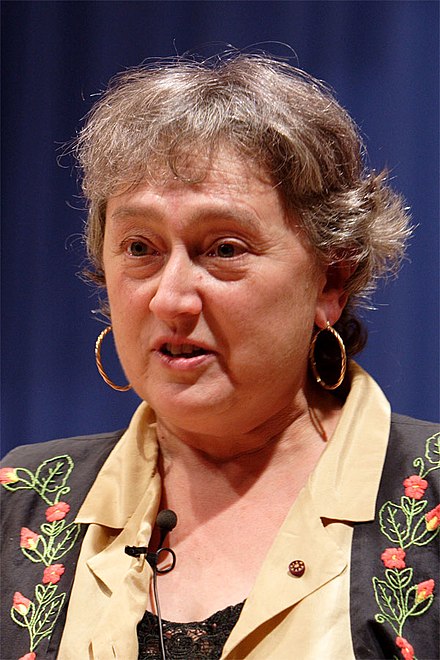
Lynn Margulis (born Lynn Petra Alexander;[2][3] March 5, 1938 – November 22, 2011)[4] was an American evolutionary biologist, and was the primary modern proponent for the significance of symbiosis in evolution. Historian Jan Sapp has said that “Lynn Margulis’s name is as synonymous with symbiosis as Charles Darwin‘s is with evolution.”[5] In particular, Margulis transformed and fundamentally framed current understanding of the evolution of cells with nuclei – an event Ernst Mayr called “perhaps the most important and dramatic event in the history of life”[6] – by proposing it to have been the result of symbiotic mergers of bacteria. Margulis was also the co-developer of the Gaia hypothesis with the British chemist James Lovelock, proposing that the Earth functions as a single self-regulating system, and was the principal defender and promulgator of the five kingdom classification of Robert Whittaker.
Throughout her career, Margulis’ work could arouse intense objection (one grant application elicited the response, “Your research is crap. Don’t ever bother to apply again.”)[5][7] and her formative paper, “On the Origin of Mitosing Cells”, appeared in 1967 after being rejected by about fifteen journals.[8] Still a junior faculty member at Boston University at the time, her theory that cell organelles such as mitochondria and chloroplasts were once independent bacteria was largely ignored for another decade, becoming widely accepted only after it was powerfully substantiated through genetic evidence. Margulis was elected a member of the US National Academy of Sciences in 1983. President Bill Clinton presented her the National Medal of Science in 1999. The Linnean Society of London awarded her the Darwin-Wallace Medal in 2008.
From https://en.wikipedia.org/wiki/Lynn_Margulis
Selected Bibliography
- Margulis, Lynn (1970). Origin of Eukaryotic Cells, Yale University Press, ISBN0-300-01353-1
- Margulis, Lynn (1982). Early Life, Science Books International, ISBN0-86720-005-7
- Margulis, Lynn, and Dorion Sagan (1986). Origins of Sex : Three Billion Years of Genetic Recombination, Yale University Press, ISBN0-300-03340-0
- Margulis, Lynn, and Dorion Sagan (1987). Microcosmos: Four Billion Years of Evolution from Our Microbial Ancestors, HarperCollins, ISBN0-04-570015-X
- Margulis, Lynn, and Dorion Sagan (1991). Mystery Dance: On the Evolution of Human Sexuality, Summit Books, ISBN0-671-63341-4
- Margulis, Lynn, ed. (1991). Symbiosis as a Source of Evolutionary Innovation: Speciation and Morphogenesis, The MIT Press, ISBN0-262-13269-9
